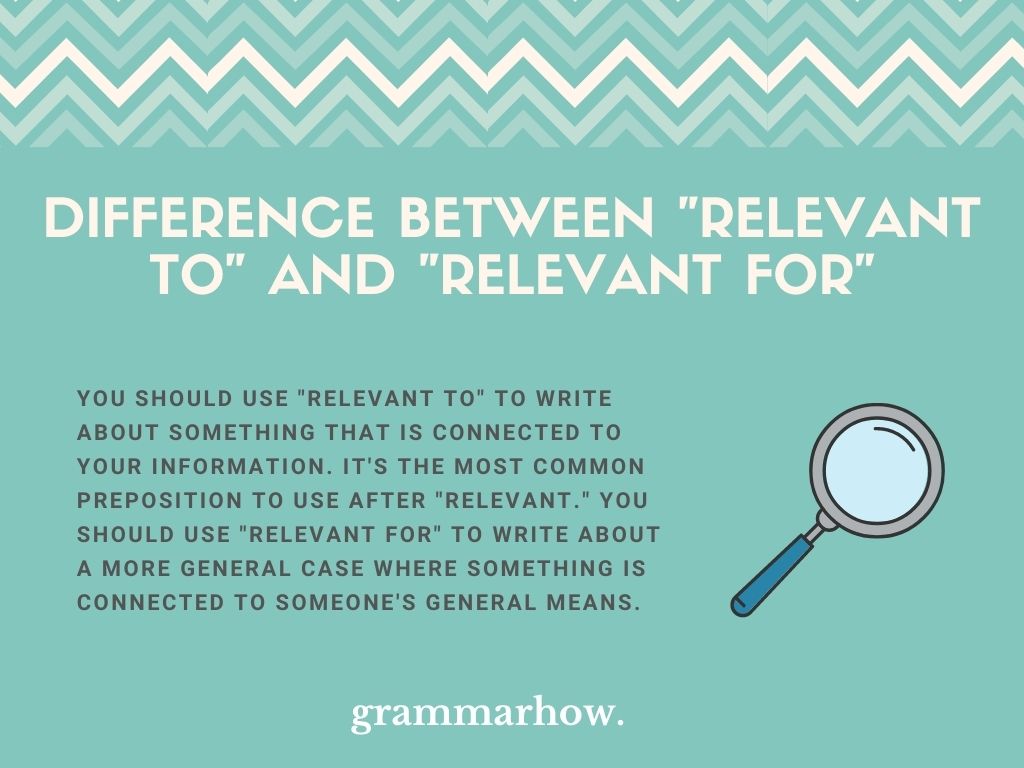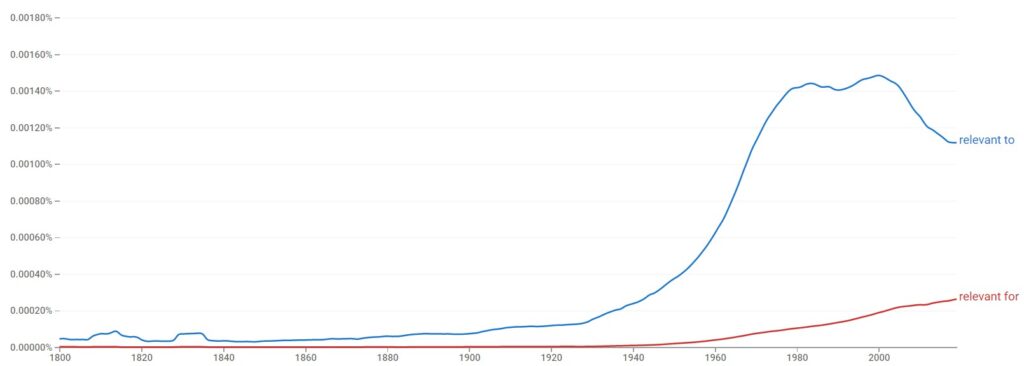Using prepositions after an adjective can have a large impact on the overall meaning. Look at the words “relevant to” and “relevant for.” They’re similar but manage to construct different sentence meanings. This article will explore those meanings and how to use them.
What Is The Difference Between “Relevant To” And “Relevant For”?
You should use “relevant to” to write about something that is connected to your information. It’s the most common preposition to use after “relevant.” You should use “relevant for” to write about a more general case where something is connected to someone’s general means.

The meanings of the two phases are almost identical. It mostly comes down to how familiar you are with the prepositions in English which dictates whether you’ll struggle with understanding which preposition is used where.
For the most part, “relevant to” is correct. You’ll find that if you’re struggling between the choices, “relevant to” is your safest bet. However, there are cases where “relevant for” is more popular. These cases only apply when talking about a general method for something.
- These are not relevant for your purposes.
This example shows what we mean about including a method or means.
What Does Relevant To Or For Mean?
While it’s great to learn about the prepositions and what they do to the word, it’s probably better to start by exploring the definition of “relevant.”
The definition of “relevant,” according to The Cambridge Dictionary, is “connected with what is happening or being discussed.”
We use “relevant” when we’re talking about information that links or connects with what we’re talking about in a meaningful way. Typically, we ignore irrelevant information that will have no noticeable impact on the current discussion.
Only using relevant information for a discussion is a great way to keep your efficiency up in whatever you’re talking about. Many people grow tired or bored when listening to discussions that only use irrelevant information.
It’s something that’s drilled into you in the business world. You have to make sure to keep relevant and to the point when you want to present new or exciting ideas; otherwise, you’ll have a hard time keeping people interested.
Can “Relevant To” And “Relevant For” Be Used Interchangeably?
Generally speaking, you’re able to use prepositions interchangeably if their means are similar. In the case of “relevant to” and “relevant for,” it seems likely that many writers do use them interchangeably.
You can use “relevant to” and “relevant for” interchangeably to talk about something that connects with something or somebody at any given time. Generally, people use “relevant to” more often, though both works.
- This is relevant to you.
- This is relevant for you.
These examples show you just how easy it is to use them both. “To” and “for” are very similar prepositions. They don’t have much overall impact on the meaning of the adjective they’re connected to because they’re so similar to each other.
The first example means something is connected to what someone is looking for, while the second example means the same thing. This is what we’re looking to see when determining whether two phrases are synonymous.
- These are not relevant for your purpose.
- These are not relevant to your purpose.
We can also use them the other way round with the original intended meaning of “for.” Still, the two prepositions are interchangeable. This makes learning about them much easier since it’s unlikely that you’ll get them wrong (as they’re both right).
Is “Relevant To” Or “Relevant For” Used The Most?
While they are both interchangeable, that doesn’t mean they’re both popular. We have some statistics to show you the clear difference in native English writing between them.
According to this graph, “relevant to” is the most popular choice. “Relevant for” wasn’t even used until about the 1940s and has been slowly increasing in use, though “relevant to” has always been prevalent and will continue to be for a while yet.

Generally, graphs like this are great indicators of language trends. If one phrase is clearly more popular than another (like in the case of “relevant to”), it’s likely that most native speakers would prefer you use that one.
While we’re not strictly saying you should ignore learning about “relevant for,” it does put less pressure on you having to learn about what it means.
Examples Of How To Use “Relevant To” In A Sentence
To help you tell the differences between them, we’re going to return to the original meanings we provided at the start of this article. From there, we’re going to give you some examples using each one in the correct form.
“Relevant to” means writing about something that connects to the current information we discuss with other people.
- This is very relevant to me, and I implore you to hear me out.
- This information is relevant to the investigation, so we have to go over it.
- I don’t think this is relevant to what I asked, but I’ll listen nonetheless.
- Is there anything here that’s relevant to what we know?
- I want to be relevant to everyone in my life.
- We have found new information relevant to the inquiry.
- Do we have anything relevant to add?
“Relevant to” is used in a variety of ways. Every time we use it, it shows that something is clearly and obviously connected to what we’re looking into or discussing.
As we’ve said, “relevant for” is synonymous and interchangeable in most cases. It’s possible to replace “to” with “for” in all of the above examples and still be grammatically correct.
Examples Of How To Use “Relevant For” In A Sentence
“Relevant for” means writing about a more general means or method in which something is relevant (or not relevant).
- I don’t think any of this is relevant for your recovery.
- We can’t find anything that’s relevant for the patients.
- There isn’t much here that’s relevant for your methods.
- I don’t know where to go to find information relevant for your parents.
- Can you help me find something that’s relevant for me?
- They only work on things relevant for their agenda.
- Is anything here relevant for the medical studies?
“Relevant for” is much less common than “relevant to.” It’s also likely that some native speakers won’t like to hear it because it’s so uncommon for it to come up.
You’re mostly better off using “relevant to” if you want to make sure you’re speaking in a grammatically correct way.
What Is The Difference Between “Relevant” And “Relevance”?
“Relevant” is an adjective talking about something that matters and is clear and appropriate for a discussion. “Relevance” is the noun form of “relevant” to show that something is connected or related to the discussion.
- These matters are relevant to us. (Adjective form)
- These matters hold no relevance to us. (Noun form)
The two words are interchangeable in most ways, though “relevant” is a descriptive word, and “relevance” is the name for something.
Is “Relevancy” A Word?
“Relevancy” is a word that is identical in meaning to “relevant.” It’s not common to use and isn’t officially recognized by all dictionaries, though some do indicate that its meaning is synonymous with “relevance.”
What Is The Difference Between “Relevant” And “Important”?
“Relevant” talks about something specifically related to a subject. “Important” talks about anything of great significance or value. “Relevant” things are always “important,” but “important” things aren’t always “relevant.”
- This information is relevant to the investigation.
This means that we’ve found information that connects with the investigation in a very obvious manner.
- This information is important to the investigation.
This means that we’ve found very valuable information. It somewhat relates to the investigation, but there’s currently no guarantee that it’ll be the most relevant thing; it could simply be a valuable item that leads us to the next most important thing.
What Is The Difference Between “Related” And “Relevant”?
“Related” is an adjective referring to a family connection or a verb relating to the connection between two things. “Relevant” is an adjective used to talk about clear and related things to a situation.
The meanings are very similar, but there’s one key difference. “Related” is almost always used to talk about families when it’s in the adjective form. If it’s not in the adjective form, then it’s a verb, which is impossible for “relevant” to be.
- He is related to me by blood.
- This is related to everything I’ve mentioned.
- We are related.
“Relevant” information is “related” to an investigation or discussion. However, “related” things don’t always have to be “relevant” since we don’t often talk about our family members as “relevant.”
Relevant – Synonyms
Let’s check out some great synonyms and alternatives to using relevant. If you’re confused about the prepositions, we recommend one of these in place of the adjective to help you out.
- Pertinent
- Applicable
- Apposite
- To the purpose
- To the point
- Connected
- Related
- Linked
- Suitable
- Fitting
Any of these are great synonyms if you can make use of them. Typically, these will work in the same sentences where “relevant” will work, which gives you plenty of freedom to use them however you see fit.

Martin holds a Master’s degree in Finance and International Business. He has six years of experience in professional communication with clients, executives, and colleagues. Furthermore, he has teaching experience from Aarhus University. Martin has been featured as an expert in communication and teaching on Forbes and Shopify. Read more about Martin here.
